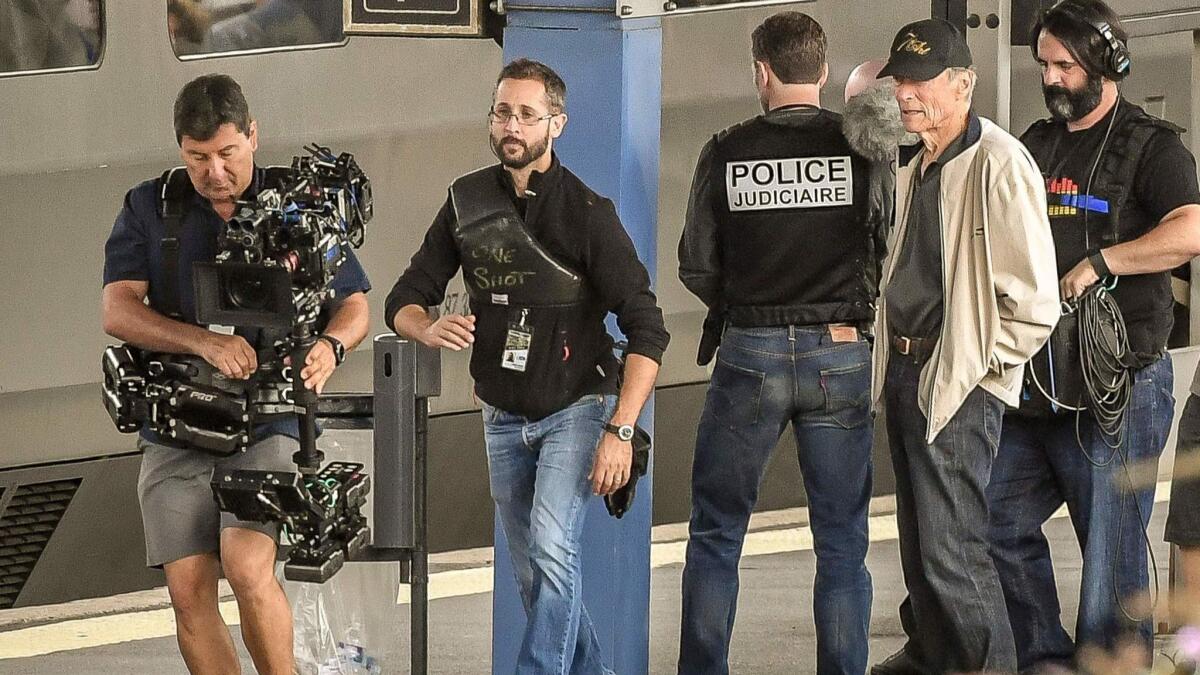Hollywood studios win as European countries vie for U.S. production dollars
- Share via
In “Mission: Impossible — Fallout,” the upcoming sixth installment of Paramount’s action franchise, Ethan Hunt (Tom Cruise) travels to Paris where he engages in vehicular mayhem on the city’s narrow streets, dangles from the ceiling of the Grand Palais and guns his motorcycle around the Arc de Triomphe.
Hollywood loves a working European vacation. It also loves the financial incentives that European countries dole out to lure foreign movie and TV productions to their shores. “M:I 6,” which opens July 27, not only received tax credits from the French government but also qualified for British incentives for shooting in the London area.
The competition for Hollywood production dollars is heating up as countries including France, Germany and Portugal have sweetened their rebates and credits, hoping to reverse the tide of U.S. productions that have flocked to Eastern and Central Europe, where labor is cheaper.
The winners in this tug of war are the Hollywood studios, which have their pick of an increasingly generous array of rewards in the U.S. and abroad.
Last year, France’s incentive program lowered the minimum expenditure level for foreign productions by 75% to attract more shoots and post-production work. Germany launched a second film fund last summer to augment its existing program. In February, Portugal started its first production incentive — a cash rebate geared toward Hollywood film and TV shoots.
Most European countries now offer some form of filming incentives, which can save studios a significant amount each year. The British government paid out 415 million pounds ($578.7 million) in film tax relief in fiscal 2016-17, up more than 20% from the previous year, according to government reports.
Other countries have smaller incentive programs but are attracting larger shoots, especially Hungary, which hands out about 52.7 million euros ($64.8 million) a year in tax rebates for movies.
Recent productions include the Netflix sci-fi movie “Spectral” and the Keira Knightley period drama “Colette,” which premiered at this year’s Sundance Film Festival and opens this fall. Both were filmed in the Budapest area.
“Certainly, these productions are shopping around to find the best place to set up their films,” said Ildikó Kemény, managing director of Pioneer Pictures, one of Hungary’s leading production companies. “And we are part of that competition.”
She was talking by phone from Hungary during a break in shooting Amazon Studios’ “Radioactive,” a biopic of Marie Curie starring Rosamund Pike, which is being co-produced by StudioCanal. Kemény’s company has also worked on 20th Century Fox’s “Red Sparrow” and the second season of “Genius,” which premieres April 24 on National Geographic.
“Budapest is very chameleon-like. We can stand in for all sorts of European countries and capitals,” Kemény said. The new TNT series “The Alienist” used the city to stand in for 19th century New York.
Hungary offers one of the most generous film programs in Europe, allowing productions to get back 25% of their expenditures in the form of a tax rebate. Some expenses incurred outside of Hungary can also qualify for the country’s rebate.
“Red Sparrow,” starring Jennifer Lawrence, was shot primarily in Hungary, but the movie also spent time filming in nearby Slovakia and Austria. Those expenses were also eligible for a rebate of up to 25% under Hungary’s program.
Other Central and Eastern European countries have lured major Hollywood shoots with their combination of incentives and inexpensive labor. Croatia handed out rebates to “Star Wars: The Last Jedi” and the HBO series “Game of Thrones,” both of which were shot partially in the country on the Adriatic Sea.
Croatia also lured Universal’s upcoming sequel “Mamma Mia! Here We Go Again,” which was shot extensively on the island of Vis, substituting for Greece. The movie musical, which opens July 20, qualified for the Croatian rebate, according to a Universal Pictures spokesman. He declined to elaborate on the size of the rebate.
A spokesperson for the Croatian Audiovisual Center said that the number of U.S. productions has steadily increased since the rebate was introduced in 2012, when just one was filmed in the country. Last year, four U.S. projects were shot in Croatia.
Greece doesn’t offer incentives, but the government is reportedly working on developing a program.
Budapest is very chameleon-like. We can stand in for all sorts of European countries and capitals.
— Ildikó Kemény, managing director of Pioneer Pictures, one of Hungary’s leading production companies
The patchwork of European filming incentives can present an overwhelming array of choices for Hollywood producers looking to field the best deals, said Joseph Chianese, executive vice president of EP Financial Solutions, a Burbank company that advises entertainment companies on filming incentives.
He said some European countries such as Britain and Hungary don’t impose a ceiling on how much productions can claim, which enables movies and TV series to apply for incentives no matter how much they spend.
“Bringing a project to a jurisdiction without caps brings a lot of certainty,” Chianese said. In addition, some countries allow above-the-line expenses — such as star salaries — to qualify for incentives. That’s not the case in California, where above-the-line expenses are excluded from the state’s tax credit program.
For the host countries, incentives are seen as a worthwhile investment because Hollywood productions can create jobs and bring a welcome infusion of spending at businesses. But critics say that the economic stimulus isn’t enough to outweigh the cost to taxpayers who shoulder these programs.
France says its production tax credits helped to generate 2.02 billion euros in spending and create more than 15,000 jobs in 2017. But French officials haven’t announced how much the program gave away in credits to film and TV productions.
The country has seen the number of foreign shoots rise after it increased its tax credit to 30% from 20% in early 2016. Officials said the country had 52 international projects last year, 30 more than in 2015.
One beneficiary was “Dunkirk,” which did five weeks of filming in northern France. The Oscar-winning film directed by Christopher Nolan generated 19 million euros in local expenditures and employed at least 450 French crew members.
“The 15:17 to Paris,” which opened last month, also received a French tax credit. The Clint Eastwood movie was filmed last year in the northern French city of Arras and also in the French capital. Both films were released by Warner Bros.
“Today, American producers are our top foreign ‘customers,’” said Frédérique Bredin, president of the National Center of Cinema and the Moving Image, the regulatory organization that oversees tax credits and other aspects of the French production industry.
“In an industry that is becoming globalized, this program is allowing us to assert our know-how,” Bredin said via email. She said France is also trying to attract more post-production work.

“Blade Runner 2049,” which won two Oscars, was shot almost entirely in Hungary, but some of its post-production took place in France at the visual-effects company Buf, which enabled the movie to qualify for the French tax credit program.
Some studios are reluctant to discuss financial incentives. Warner Bros., Fox and Sony didn’t respond to requests for comment. Walt Disney Co. also declined to comment. Disney’s four most recent “Star Wars” movies — including the upcoming “Solo,” opening in May — all were filmed mostly in Britain and qualified for the country’s tax incentives
Germany’s film fund, which launched last year, was successful in drawing Sony Pictures’ upcoming “The Girl in the Spider’s Web” to shoot in Berlin. The movie, starring Claire Foy as Lisbeth Salander, is in production and set to open later this year.
The new program is funded at 75 million euros for 2018, supplementing the existing program of 50 million euros.
Portugal’s new cash rebate program is much smaller, at 10 million euros for its first year, but the country boasts an asset that competing countries in Eastern and Central Europe don’t have — warm weather for most of the year.
The relatively balmy climate allows productions more flexibility because outdoor shoots are possible almost year-round, said Ana Mendes Godinho, the country’s secretary of state for tourism.
“We like to say we are the California of Europe,” she said.
More to Read
Inside the business of entertainment
The Wide Shot brings you news, analysis and insights on everything from streaming wars to production — and what it all means for the future.
You may occasionally receive promotional content from the Los Angeles Times.











